Text
Time to learn about more people and things that influenced my politics~
The Combahee River Collective.
They were a Black feminist lesbian socialist organization active in Boston, Massachusetts from 1974 to 1980.
"The Collective argued that both the white feminist movement and the Civil Rights Movement were not addressing their particular needs as Black women and more specifically as Black lesbians.
Racism was present in the mainstream feminist movement, while Delaney and Manditch-Prottas argue that much of the Civil Rights Movement had a sexist and homophobic reputation."
The Collective is perhaps best known for developing the Combahee River Collective Statement, a key document in the history of contemporary Black feminism and the development of the concepts of identity politics as used among political organizers and social theorists, and for introducing the concept of interlocking systems of oppression, including but not limited to gender, race, and homophobia, a fundamental concept of intersectionality. Gerald Izenberg credits the 1977 Combahee statement with the first usage of the phrase "identity politics".
Source
Demita Frazier, Beverly Smith, and Barbara Smith were the primary authors of the Combahee River Collective Statement in 1977. [...]They sought to destroy what they felt were the related evils of capitalism, imperialism, and patriarchy while rejecting the belief in lesbian separatism. Finally their statement acknowledged the difficulties black women faced in their grassroots organizing efforts due to their multiple oppressions.
In “A Black Feminist’s Search for Sisterhood,” Michele Wallace arrives at this conclusion:
We exists as women who are Black who are feminists, each stranded for the moment, working independently because there is not yet an environment in this society remotely congenial to our struggle—because, being on the bottom, we would have to do what no one else has done: we would have to fight the world. [2]
Wallace is pessimistic but realistic in her assessment of Black feminists’ position, particularly in her allusion to the nearly classic isolation most of us face. We might use our position at the bottom, however, to make a clear leap into revolutionary action. If Black women were free, it would mean that everyone else would have to be free since our freedom would necessitate the destruction of all the systems of oppression.
#Combahee River Collective#Black Lesbian Feminism#Lesbian Black Feminism#Black Lesbian History#Lesbian Black History#lgbt history#lgbtq history#queer history#lesbian history
122 notes
·
View notes
Text
[Image ID Start:]
A magazine article featuring a black-and-white photograph of a black femme and a white butch. The femme holds their baby in her lap. Below the photograph is a caption that reads, "When Sparkle Christel [the baby] learns to read her birth certificate, she will see the initials and last names of Lynn (left) as father and Bobbi [right] as mother."
The article, titled "Lesbian Couple Are Parents By Artificial Insemination, reads as follows:
"There are four thinks linking Bobbi and Lynn of Oakland.
They both were born in the same charity hospital in Louisiana, but didn't meet until 20 years later.
They both are lesbians in an interracial relationships.
Both are flouting the racial and sexual codes under which they were reared.
And, thanks to artificial insemination, they are the proud parents of a baby girl named Sparkle Christel, now four months old. But it was no ordinary artificial insemination. Lynn's brother was the donor.
The story of Lynn and Bobbi's quest to become parents was told to Judie Tefler of the Knight-Ridder Newspapers.
Lynn, who's White, and Bobbi, who's Black, said they couldn't bear the though of Bobbi having intercourse with a man to become pregnant, so they hit upon the insemination idea.
As Bobbi explained, "When I made the decision to be with women, I never was in the closet."
When they finally located a physician in Berkeley who was willing to perform the procedure, they discovered that his fee, $50 each time it was tried until Bobbi became pregnant, was more than they were able to afford.
So the read up on the subject and paid a male friend to provide the semen. Then they performed the insemination themselves--to no avail.
Then it occurred to them that, so Lynn could be the "proximate"--meaning as close as possible--father of the child, one of her brothers should be the donor, they said.
Then their luck changed. They not only found a clinic where a sympathetic nurse offered to teach them more about the procedure, but one of Lynn's brothers, visiting from Louisiana, agreed to donate his sperm.
And so the third time was a charm. Bobbi became pregnant within two weeks.
"It seems like nine months takes longer when you know from the start," said a beaming Lynn.
After attending natural childbirth classes together, the couple were ready for the big event. "Boy, they let you take pictures of the whole thing these days!" exclaimed Lynn, who did just that in a hospital operating room.
When the baby was brought to her, Bobbi pulled a fast one on the unsuspecting nurses, who did not know Lynn's and her relationship. She said, "Gosh, Lynn, she's White just like you!"
The nurses, not knowing whether to laugh, instead screwed up their faces in puzzlement, Bobbi recounted.
Why was Bobbi the mother rather than Lynn?
Lynn explained, "Bobbi knows how it feels to be a mother, but being a butch, there's no way I would ever be able to have a baby."
[Image ID End.]

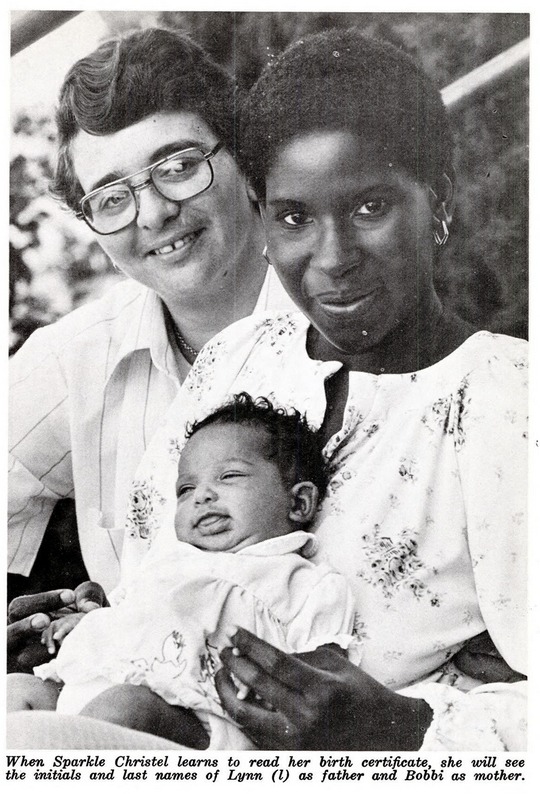
Jet (February 15, 1979)
#lgbt history#lgbtq history#queer history#lesbian history#butch history#femme history#butchfemme history#femmebutch history#sapphic history#wlw history#lesbian mothers
4K notes
·
View notes
Text
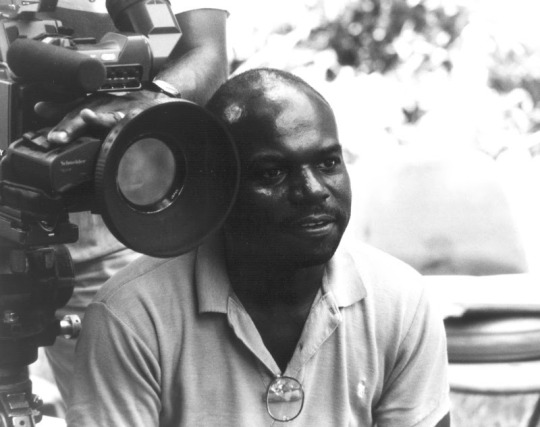
"What conservatives are very adept at, and very insightful about -- in ways that people at the center of America and on the left still don't quite get a handle on -- is how culture, not simply government and business and the law, is critical to control. Patterns of representation, ways of either including or excluding, silencing and erasing different communities and their stories, their narratives. Whether it's in the academy or on television or through the National Endowment for the Arts."
- Marlon Riggs, 1992, Black Gay Filmmaker & Artist, interview in New York Times
#Marlon Riggs#Black Queer History#Queer Black History#Black Gay History#Gay Black History#LGBT History#LGBTQ+ History#Queer History#Gay History
90 notes
·
View notes
Text
The Persecution of the Hijra Community Under British Colonial Rule

For my HIS 102 class, we were assigned to write an informative essay about a topic that was related to, but not mentioned or taught, in our curriculum for our peers to review. I chose to discuss the impact of British colonialism on hijras. I encourage my audience, especially my Indian, Bangladeshi, and Pakistani readers, to leave feedback or critiques if there is anything that I handled disrespectfully. If anyone knows more on the subject or finds something I missed or got wrong, please let me know!
The essay has been moved to a Google Doc where you can view it here!
TRIGGER WARNINGS: transmisogyny and exorsexism toward hijras, attempted genocide of hijras, domestic violence/murder, racism, alleged kidnapping, alleged forced castration, h-slur.
#hijra history#lgbt indian history#lgbtq indian history#queer indian history#lgbt bangledeshi history#lgbtq bangladeshi history#queer bangladeshi history#lgbt pakistani history#lgbtq pakistani history#queer pakistani history#lgbt history#lgbtq history#queer history
7 notes
·
View notes
Note
Adding onto this bc I had to write a paper on the subject recently:
In "Governing Gender and Sexuality in Colonial India," Jessica Hinchy points out that consent to become a hijra was disregarded by the British Occupation no matter their age. In one case, three adult hijra reported consenting to being castrated, but the elder hijra that had performed the procedure were charged anyway because officials decided their consent didn't matter because it 1) had no benefit to their health, and 2) had the risk of death or harm.
Additionally, a child's connection to hijra was very complicated! During the 1800s (and as far back as protestant revolution Germany, as I remember), it was not uncommon for monastic households to take children and raise them to become monks, nuns, or take up another form of discipleship. Sometimes families would drop off or sell their children to these households because they could not afford to take care of them. India was no different, and as hijra typically lead Hindu discipleship lineages, sometimes they would adopt, buy, or somehow else end up with a child. They were not always converted to hijra, and some would decide on their own to convert. Sometimes a child's family might also live with hijras to save money, making them roomies.
The idea that hijra were kidnapping and castrating innocent little boys was pushed by the British Occupation to further demonize them and encourage their persecution. Following investigations in 1860s North-Western Provinces, the predicted "hundreds" of hijra kidnapping and castrating children turned out to be a baseless panic. It was discovered that very few children actually lived in hijra households during this time.
All of this panic and fear resulted in the Criminal Tribes Act of 1871. Hijras so much as suspected of sodomy, kidnapping, or castration were put on a register and monitored by the police, even if there was absolutely zero evidence. This would also extend to non-hijra gender/sex-nonconforming individuals, who were registered on the basis of dressing femininely (and later, by a hired physician's assessment of impotency). This law prevented these groups from dressing femininely, preforming in public, and led to the forced removal of children in their households. (I'd like to note that some of the people assumed to be impotent actually had conceived children, and while it was not explicitly mentioned in Hinchy's book, it can be inferred that their own children might have been removed from their care bc of CTA.)
So while there may have historically been hijra who did practice kidnapping, it was probably a rare phenomenon and comparable to the actions committed by monestaries and nunneries. Hijras have definitely experienced changes over the course of around two hundred years, and there are also regional differences, so it's extremely ignorant to assume that these communities hold all the same beliefs and practices as those from the mid-nineteenth century. Continuing a narrative that demonizes hijras is promoting the colonial legacy. Don't be that person!
i have seen people saying hijiras adopt "young boys" to prey them and "convert them" in hijiras, this kinda sounds like bullshit, is this true or just racist-transphobic propaganda?
The article Lakshmi's Story says this:
At times, we hijras are in the news for the wrong reasons. Say, for kidnapping a child and forcing it to become a hijra. Here, what is needed is an unbiased and impartial inquiry. Prejudice shouldn’t dominate. That hijras receive orders from their community to convert people to their gender is a myth. Our elders have never advised us to force someone to become a hijra. The decision to become a hijra is traumatic. Once one becomes a hijra the doors to one’s earlier life are shut forever. It isn’t easy for a hijra to come to terms with his new life. The family, and indeed society as a whole, reacts strangely. Terrified, the hijra in self-defense invents the story of his having gotten kidnapped and forced into hijrahood. Sometimes, even a complaint to that effect is lodged! Of course, it’s not as if hijras never kidnap kids. But then the community doesn’t forgive them. Like mainstream society, the hijra community too has its share of criminals. Though the laws of the land should be sufficient to deal with them, crimes by hijras are often exaggerated and the hijras are chastised. Disproportionate punishment is meted out to us by the police and the public. This is unfair.
It seems like this belief about hijras kidnapping children has roots in Britain's colonial occupation (The long history of criminalising Hijras / The Hijra Panic)
#the source for this rant is Jessica Hinchy's book btw#definitely worth the read + there's a free pdf online through TransReads#lgbt history#lgbtq history#queer history#hijra history
260 notes
·
View notes
Text

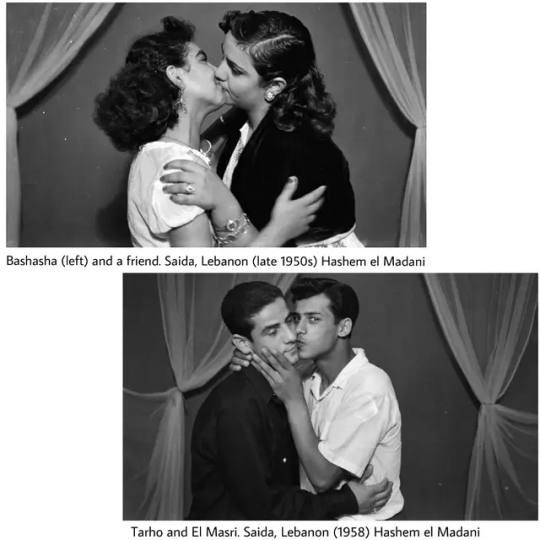


Portraits by Lebanese photographer Hashem el Madani (1950s-70s)
#queer Lebanese history#lgbt Lebanese history#Lebanese history#lgbt history#lgbtq history#queer history#lesbian history#gay history#bi history
5K notes
·
View notes
Text

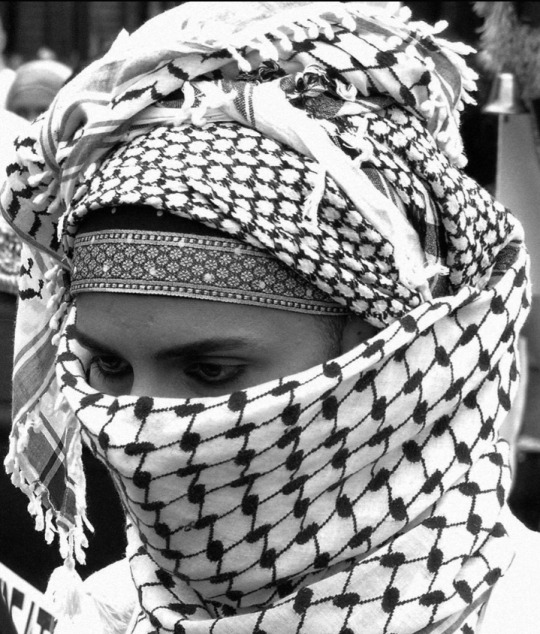
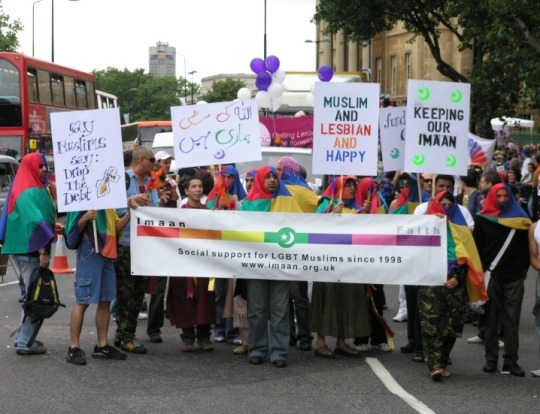
Pride London (2005) by James M Thorne
#london pride 2005#lgbt history#lgbtq history#queer history#lesbian history#gay history#bisexual history#transgender history#LGBT muslims#lgbt muslim history#muslim history#queer muslim history#lesbian muslim history#gay muslim history#bisexual muslim history#transgender muslim history
1K notes
·
View notes
Photo
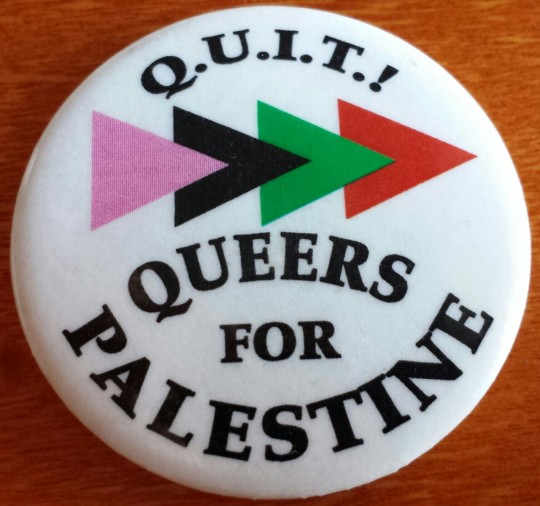
Queers Undermining Israeli Terrorism (Q.U.I.T.), San Francisco, [early 2000’s].
22K notes
·
View notes
Text
Hello everyone!
I'm so sorry for the lack of original posts or activity. I actually started working towards getting a BA in queer history, so all of my time has been put into my classes.
Over time I've noticed problems in my posts that I want to fix, mainly in formatting the citations. Whenever I get the time, my primary focus will be on revising my old posts and also making them available via a Google Doc. My hope is that one day I'll be able to do this more across multiple social media platforms, even YouTube maybe where I make essay-format videos about these topics. BUT that's a long way off.
Thank you to everyone who has supported my work! I can't wait to be able to do this as a career and reach even more people.
1 note
·
View note
Text
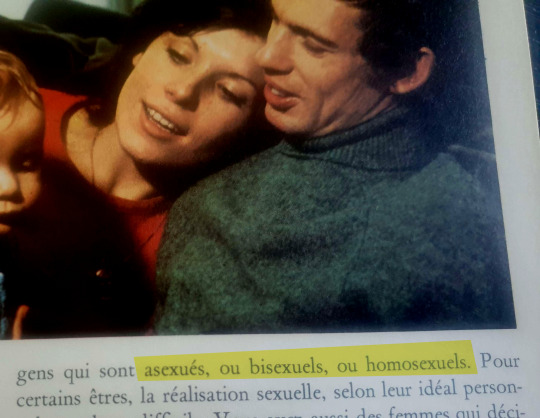
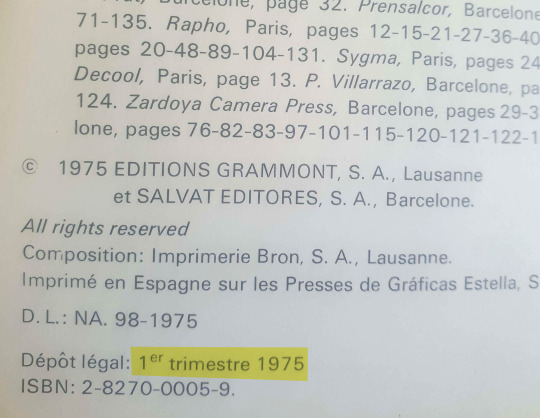

If anyone ever gets on your ass about asexuality being a recent tumblr thing, have this french book from 1975 who specifically talk about "asexuate, bisexual, or homosexual" people.
We've always been there, even if the vocabulary might have changed.
#lgbt history#lgbtq history#queer history#asexual history#ace history#acespec history#bisexual history#bi history#biromantic history#gay history
1K notes
·
View notes
Text

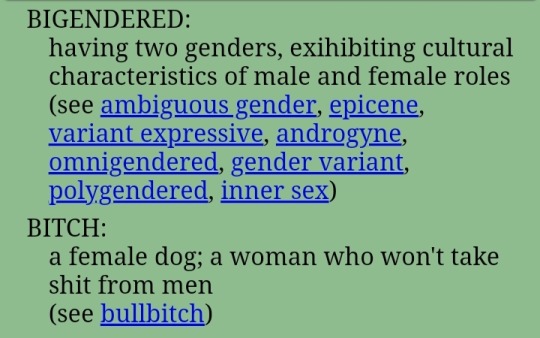

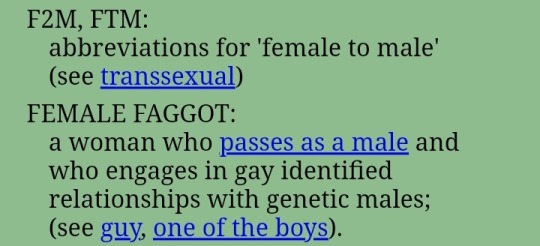



FTM International 1997 (x)
6K notes
·
View notes
Text
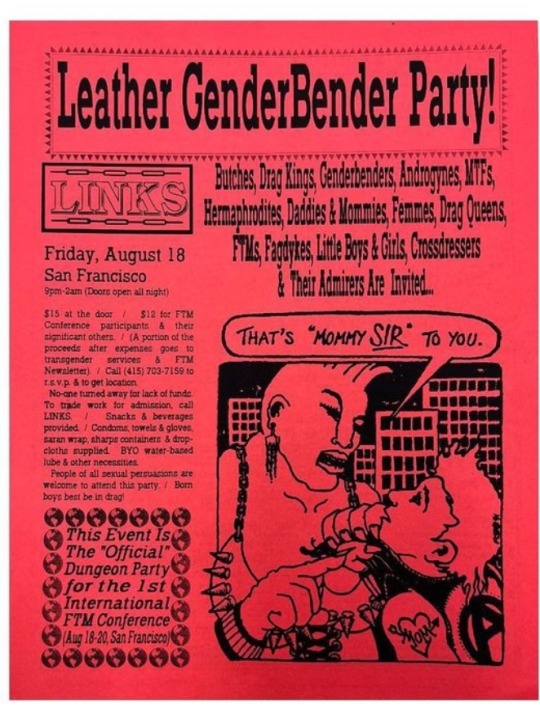

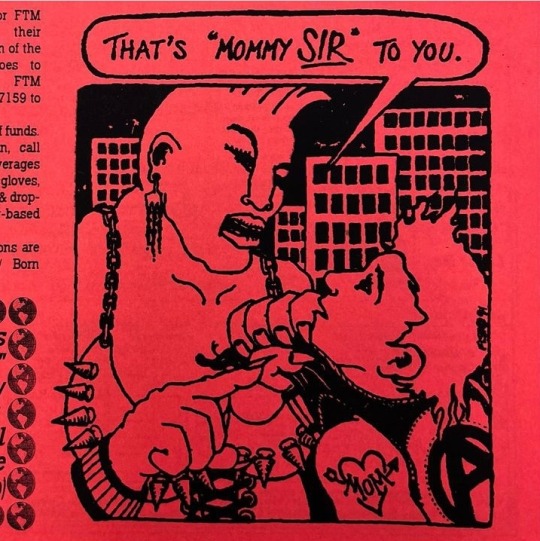
Flyer for dungeon party at the first International FTM Conference of the America's (August 1995 San Francisco)
12K notes
·
View notes
Text
What's Your Pronoun? Beyond He & She by Dennis Baron FREE PDF!
Description: “Addressing one of the most pressing cultural questions of our generation, Dennis Baron reveals the untold story of how we got from he and she to zie and hir and singular-they...Far more than a by-product of the culture wars, gender-neutral pronouns are, however, nothing new. Pioneering linguist Dennis Baron puts them in historical context, noting...people have been coining new gender pronouns, not just hir and zie , for centuries. Based on Baron’s own empirical research, What’s Your Pronoun? chronicles the story of the role pronouns have played―and continue to play―in establishing both our rights and our identities.” (Goodreads)
LINK: https://docdro.id/fegCQvm
#lgbt history#lgbtq history#queer history#trans history#transgender history#transsexual history#nonbinary history#pronoun history#neopronoun history
1 note
·
View note
Note
i have seen people saying hijiras adopt "young boys" to prey them and "convert them" in hijiras, this kinda sounds like bullshit, is this true or just racist-transphobic propaganda?
The article Lakshmi's Story says this:
At times, we hijras are in the news for the wrong reasons. Say, for kidnapping a child and forcing it to become a hijra. Here, what is needed is an unbiased and impartial inquiry. Prejudice shouldn’t dominate. That hijras receive orders from their community to convert people to their gender is a myth. Our elders have never advised us to force someone to become a hijra. The decision to become a hijra is traumatic. Once one becomes a hijra the doors to one’s earlier life are shut forever. It isn’t easy for a hijra to come to terms with his new life. The family, and indeed society as a whole, reacts strangely. Terrified, the hijra in self-defense invents the story of his having gotten kidnapped and forced into hijrahood. Sometimes, even a complaint to that effect is lodged! Of course, it’s not as if hijras never kidnap kids. But then the community doesn’t forgive them. Like mainstream society, the hijra community too has its share of criminals. Though the laws of the land should be sufficient to deal with them, crimes by hijras are often exaggerated and the hijras are chastised. Disproportionate punishment is meted out to us by the police and the public. This is unfair.
It seems like this belief about hijras kidnapping children has roots in Britain's colonial occupation (The long history of criminalising Hijras / The Hijra Panic)
260 notes
·
View notes
Text
Mustarjil is an Arabic term meaning “becoming [a] man.” Although it can be used derogatorily to refer to women who are perceived as having a masculine appearance and/or mannerisms, in Iraq’s marshes, it existed as a gender identity. Within the context of the Ahwari community, Mustarjil was a common gender identity, where people assigned female at birth decide to live as a man after puberty, and this decision was generally accepted in the community. The Mustarjils were one of many similar third gender categories around the world, such as the Hijras in South Asia. [...]
“One afternoon, some days after leaving Dibin, we arrived at a village on the mainland. The sheikh was away looking at his cultivations, but we were shown to his mudhif by a boy wearing a head-rope and cloak, with a dagger at his waist. He looked about fifteen and his beautiful face was made even more striking by two long braids of hair on either side. ln the past all the Madan (Ahwari) wore their hair like that, as the Bedu still did. After the boy had made us coffee and withdrawn, Amara asked, ‘Did you realize that was a mustarjil?’ I had vaguely heard of them, but had not met one before.
‘A mustarjil is born a woman’. ‘She cannot help that; but she has the heart of a man, so she lives like a man.’
‘Do men accept her?’
‘Certainly. We eat with her and she may sit in the mudhif. When she dies, we fire off our rifles to honour her. We never do that for a woman. In Majid’s village there is one who fought bravely in the war against Haji Sulaiman.’
‘Do they always wear their hair plaited?’
‘Usually they shave it off like men.’
‘Do mustarjils ever marry?’
‘No, they sleep with women as we do.’”
Thesiger continues to narrate several other accounts of mustarjils within the same community, as well that of a “stout middle-aged woman” who wanted to remove her male organ in order to “turn into a proper woman.” Thesiger later mentions: “Afterwards I often noticed the same [person] washing dishes on the river bank with the women. Accepted by them, [she] seemed quite at home. These people were kinder to [her] than we would have been in our society.” Around that time, Britain was still living under the shadow of Victorian norms, and gender non-normative people were still stigmatized and shunned. Communities such as the Ahwaris, presented an alternative model that created space for communities like the mustarjils, despite the dominant gender binary.
— Recovering Arab Trans History: Masoud El Amaratly, the Folk Music Icon from Iraq’s Marshes by Marwan Kaabour
#lgbt history#lgbtq history#queer history#trans history#transgender history#transsexual history#trans man history#trans men history#transgender man history#transgender men history#transsexual men history#transsexual man history#ftm history#transmasc history#arab trans history#arabic trans history#iraq trans history#iraqi trans history#mustarjil#mustarjil history
7K notes
·
View notes
Text
1: What does it mean to be polygendered?
Polygendered people are transgendered. Transgendered people are defined by TGS-PFLAG as "individuals of any age or sex who manifest characteristics, behaviors or self-expression, which in their own or someone else's perception, istypical of or commonly associated with persons of another gender." Among transgendered people, there are transsexuals (who get sex-change operations), non-op transsexuals (who fulfill all the steps of a sex-change except for the genital operation), drag kings and queens (who dress as the "opposite" sex for performances) and transvestites (who do so all the time). And then there are us, the less well-known transgender folks. We are people who identify as bi-gendered, non-gendered, or third-gendered. We may feel we belong to more than one gender, that we have no gender at all, or that we are our own gender, something neither male nor female.
2: How are polygendered people different from "regular" transgendered folks?
Just like any other transgendered people, we might have a different name for ourselves than the gendered name we were given at birth; we might dress differently than most people of our birth gender and try to "pass" as another gender on a daily basis; we might take hormones or get operations to modify our bodies. The difference is that we are not "switching" from female to male or vice versa; we are going from living as female to living as both female and male, or living as a gay man and a lesbian and a teenage boy and a drag king, or living as no gender at all, ambiguously, or as something entirely other.
A Queergendered FAQ: A Primer by Danica Nuccitelli, of Sphere (1998)
#lgbt history#lgbtq history#queer history#trans history#transgender history#transsexual history#polygender history#bigender history#nonbinary history
71 notes
·
View notes
Text
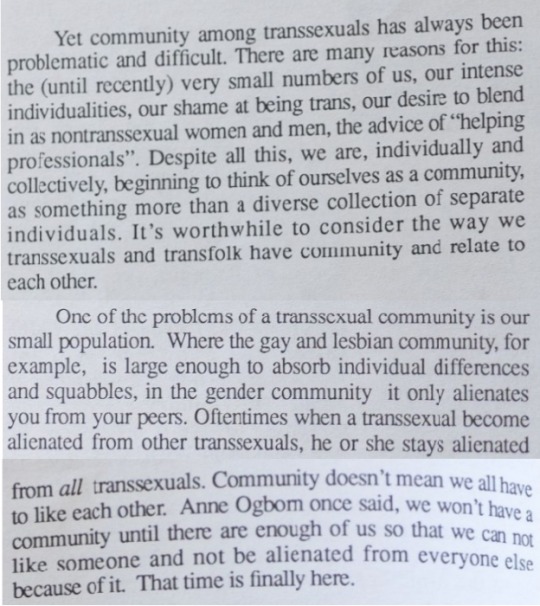

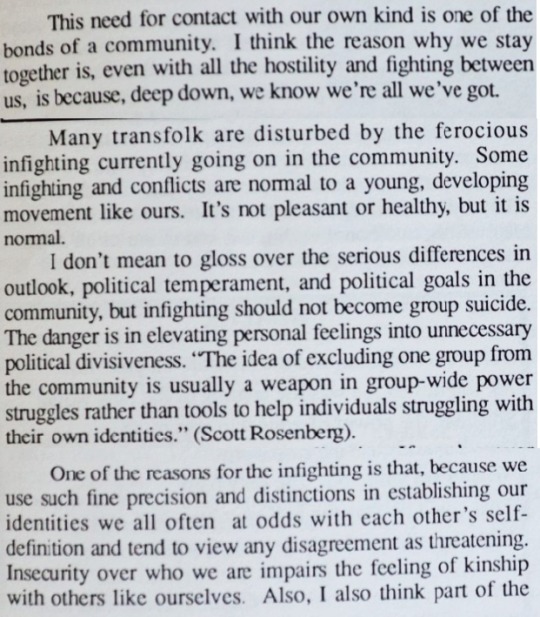
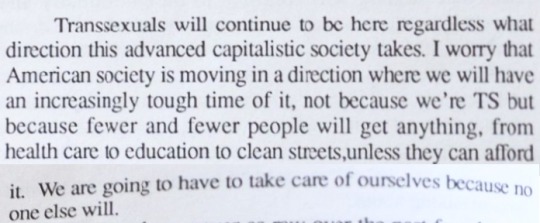


Community and Transsexuals- by Gail Sondegaard [Source: Transsexual News Telegraph 1995]
#lgbt history#lgbtq history#queer history#trans history#transgender history#transsexual history#transgender woman history#transgender women history#trans woman history#trans women history#transsexual woman history#transsexual women history#trans man history#trans men history#transgender man history#transgender men history#transsexual man history#transsexual men history#transmasc history#transfem history#ftm history#mtf history
647 notes
·
View notes